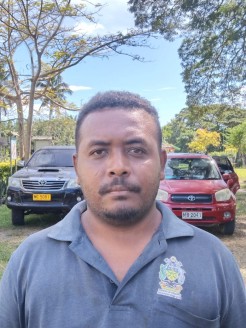
James Meimana works with the Network for Indigenous People in the Solomons (NIPS) as a Project Manager. He is also employed as a Senior Compliance Officer at the Ministry of Fisheries for the Solomon Islands. NIPS campaigns against logging and mining activities, and facilitates the Community Conservation Resilience Initiative (CCRI) in the Solomon Islands.
James is currently promoting the legal recognition of indigenous peoples and local communities in his country, both overall and in the context of natural resources and the environment. This focuses on the extent to which environmental laws support or undermine the rights of Indigenous peoples and local communities. There are also regional implications, given the typically strong presence of Indigenous peoples and customary laws but also the significant impacts of climate change on Pacific Island countries.
James said his motivation comes from his experience growing up in an Indigenous community in the Solomon Islands.
I grew up in a remote community in Santa Isabel province, far from the main capital city, Honiara. From my childhood, I saw that because of our remote location there were many instances when our communities did not receive any news about policies and regulations related to mining and logging that was affecting us. The lack of communication between the Indigenous community and policymakers remains a persistent problem.
Communities in the Solomon Islands have been impacted by one of the fastest rates of deforestation anywhere in the world, and have also been impacted by illegal fishing, over fishing and modern slavery on fishing vessels.
James’s is working to bridge the knowledge gap between the Indigenous communities and the government so that “the government decisions are more informed by community views.”
James participated in two previous DTP courses – in Indonesia in 2016 and Fiji in 2019.
I have been attending training from other organizations, but I cannot remember coming across another effective training such as DTP, I made new friends from PNG, West Papua, Fiji, Cambodia, India, Malaysia, Timor-Leste and Indonesia. We stayed in the same hotel, we exchanged information, we could go to each other’s room, had some fun together.
Among his most memorable takeaways from those training programs were knowledge about the United Nations Declaration on the Rights of Indigenous Peoples (UNDRIP) evidence gathering, engaging with the UN special procedures. As many private sectors and companies are engaged in rights violations in the Solomon Islands, especially in the logging and mining sectors, James believes that future training from DTP with a particular focus on evidence gathering would benefit the regional advocates
Learning how to collect the chain of evidence about rights violations is important. It is important for the Solomon Islands to apply UNDRIP – and that communities are able to exercise their Right to Free Prior and Informed Consent (FPIC).
DTP acknowledges the traditional custodians of the land on which we work, the Bedegal people of the Eora Nation. We recognise their lands were never ceded, and we acknowledge their struggles for recognition and rights and pay our respects to the Elders – past, present – and the youth who are working towards a brighter tomorrow. This continent always was and always will be Aboriginal land.
Aboriginal and Torres Strait Islander peoples should be aware that this website contains images or names of people who have passed away.
DTP acknowledges the traditional custodians of the land on which we work, the Bedegal people of the Eora Nation. We recognise their lands were never ceded, and we acknowledge their struggles for recognition and rights and pay our respects to the Elders – past, present – and the youth who are working towards a brighter tomorrow. This continent always was and always will be Aboriginal land.
Aboriginal and Torres Strait Islander peoples should be aware that this website contains images or names of people who have passed away.
Privacy Policy | Terms of Use | Disclaimer | Policies
© 2022 Diplomacy Training Program | ABN 31 003 925 148 | Web Design by Studio Clvr